On or about April 20, 2010, the Deepwater Horizon (DWH) mobile drilling unit exploded, caught fire, and eventually sank in the Gulf of America, resulting in a massive release of oil and other substances from British Petroleum Exploration and Production (BP) Macondo well and causing loss of life and extensive natural resource injuries. The oil came into contact with and injured natural resources as diverse as deep-sea coral, fish and shellfish, productive wetland habitats, sandy beaches, birds, sea turtles, and other protected marine life. The oil spill prevented people from fishing, going to the beach, and enjoying typical recreational activities along the Gulf of America. The oil spill also significantly impacted the health of the Gulf States’ economies, impacting a wide-array of industries such as tourism, the maritime industry, and the commercial and recreational fishing industries.
As of April 15, 2020, Alabama has committed funding to projects totaling almost $790 million.







